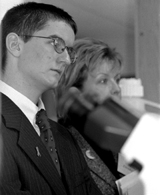By Rebecca A. Doyle

Newell Rubbermaid CEO John McDonough and high school junior Ryan Dinkgrave have two things in common. They both have Type I, or juvenile onset, diabetes and they both work to raise and distribute funds for research they hope will find a cure for the disease.
“I was not afraid of dying,” McDonough said, sharing personal feelings at a Feb. 23 press conference celebrating the JDF Center for the Study of Complications in Diabetes last month. “I was afraid of not living—of not being able to do what the other kids do.” McDonough is chairman of the board of the Juvenile Diabetes Foundation International (JDF), which awarded the U-M $6.6 million to fund research at the Center.
The Center is directed by Douglas A. Greene, professor of internal medicine and director of the Division of Endocrinology and Metabolism. Greene said that the Center at the U-M would benefit from a strong collaboration among disciplines and he revealed a new hypothesis “that may unravel this problem.” Although still five years from clinical studies, Greene says research points to a reason for diabetic neuropathy—“the Alzheimer’s disease of the peripheral nerves.”
“We have recognized over the past year that there may be an inefficient burning of fuel within these damaged cells,” he says, “which releases toxic by-products that damage the cells.”
Research at the Center focuses on the debilitating complications of diabetes that affect more than one million Americans. Those include heart problems, vision deficits, nerve damage and kidney failure that can lead to loss of limbs, blindness and death. Those with Type I diabetes are dependent on insulin from outside the body, since their bodies will not produce the required insulin. But insulin is not a cure, only a temporary measure in controlling the complications of the disease.
“The complications of diabetes extract a high price on individuals and families, and it is necessary and important that the JDF Center for the Study of Complications in Diabetes exist to find a cure to these complications,” said Allen Lichter, dean of the Medical School. “It is a great honor to be in the forefront of this cutting edge research.”
Dinkgrave, a junior at Stevenson High School in Livonia, was diagnosed at age 10 and has given himself insulin injections for six years. This year, his insulin dosage is controlled by a pump. He has volunteered with JDF and represented the organization as the Michigan delegate to the first JDF Children’s Congress in Washington, D.C., where he addressed members of Congress about the disease and the need for research and a cure.
He also has established a Web site about diabetes for children and teens and their families, www.diabetes.cbyc.com, and has raised more than $5,000 for diabetes research this year. He hopes to attend the U-M as an undergraduate student.
“This research gives hope to all of us with Type I diabetes,” Dinkgrave said.
Researchers at the Center are Eva Feldman, associate director of the Center; Christian Carter-Su, professor of physiology and associate director of the Michigan Diabetes Research and Training Center; Martin Stevens, associate professor of internal medicine; James Russell, assistant professor of neurology; Arno Kumagai, assistant professor of internal medicine; and Irina Obrosova, research investigator in internal medicine.

